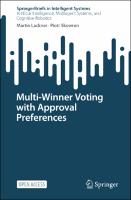Multi-Winner Voting with Approval Preferences
| dc.contributor.author | Lackner, Martin | |
| dc.contributor.author | Skowron, Piotr | |
| dc.date.accessioned | 2022-12-13T12:35:06Z | |
| dc.date.available | 2022-12-13T12:35:06Z | |
| dc.date.issued | 2023 | |
| dc.identifier | ONIX_20221213_9783031090165_20 | |
| dc.identifier.uri | https://library.oapen.org/handle/20.500.12657/60149 | |
| dc.description.abstract | From fundamental concepts and results to recent advances in computational social choice, this open access book provides a thorough and in-depth look at multi-winner voting based on approval preferences. The main focus is on axiomatic analysis, algorithmic results and several applications that are relevant in artificial intelligence, computer science and elections of any kind. What is the best way to select a set of candidates for a shortlist, for an executive committee, or for product recommendations? Multi-winner voting is the process of selecting a fixed-size set of candidates based on the preferences expressed by the voters. A wide variety of decision processes in settings ranging from politics (parliamentary elections) to the design of modern computer applications (collaborative filtering, dynamic Q&A platforms, diversity in search results, etc.) share the problem of identifying a representative subset of alternatives. The study of multi-winner voting provides the principled analysis of this task. Approval-based committee voting rules (in short: ABC rules) are multi-winner voting rules particularly suitable for practical use. Their usability is founded on the straightforward form in which the voters can express preferences: voters simply have to differentiate between approved and disapproved candidates. Proposals for ABC rules are numerous, some dating back to the late 19th century while others have been introduced only very recently. This book explains and discusses these rules, highlighting their individual strengths and weaknesses. With the help of this book, the reader will be able to choose a suitable ABC voting rule in a principled fashion, participate in, and be up to date with the ongoing research on this topic. | |
| dc.language | English | |
| dc.relation.ispartofseries | SpringerBriefs in Intelligent Systems | |
| dc.subject.classification | thema EDItEUR::U Computing and Information Technology::UY Computer science::UYQ Artificial intelligence | en_US |
| dc.subject.classification | thema EDItEUR::K Economics, Finance, Business and Management::KC Economics::KCA Economic theory and philosophy | en_US |
| dc.subject.classification | thema EDItEUR::U Computing and Information Technology::UY Computer science | en_US |
| dc.subject.other | Multi-Winner Voting | |
| dc.subject.other | Computational Social Choice | |
| dc.subject.other | Approval-Based Committee (ABC) Voting | |
| dc.subject.other | ABC Rules | |
| dc.subject.other | Proportionality | |
| dc.subject.other | Fairness Axioms | |
| dc.subject.other | Strategic Voting | |
| dc.subject.other | Collective Decisions | |
| dc.subject.other | Artificial Intelligence | |
| dc.title | Multi-Winner Voting with Approval Preferences | |
| dc.type | book | |
| oapen.identifier.doi | 10.1007/978-3-031-09016-5 | |
| oapen.relation.isPublishedBy | 6c6992af-b843-4f46-859c-f6e9998e40d5 | |
| oapen.relation.isFundedBy | f7ea308e-de3d-486f-8ae7-aceec0a0b938 | |
| oapen.relation.isbn | 9783031090165 | |
| oapen.imprint | Springer | |
| oapen.pages | 121 | |
| oapen.place.publication | Cham | |
| oapen.grant.number | [...] |

